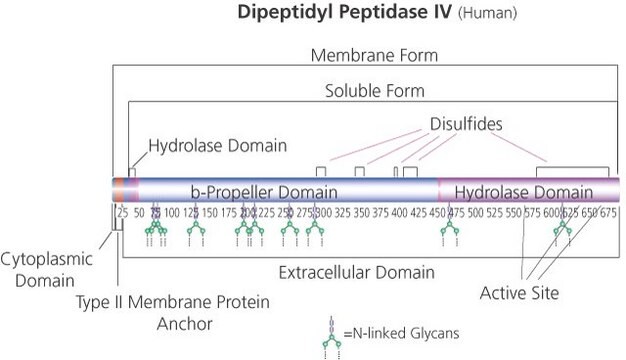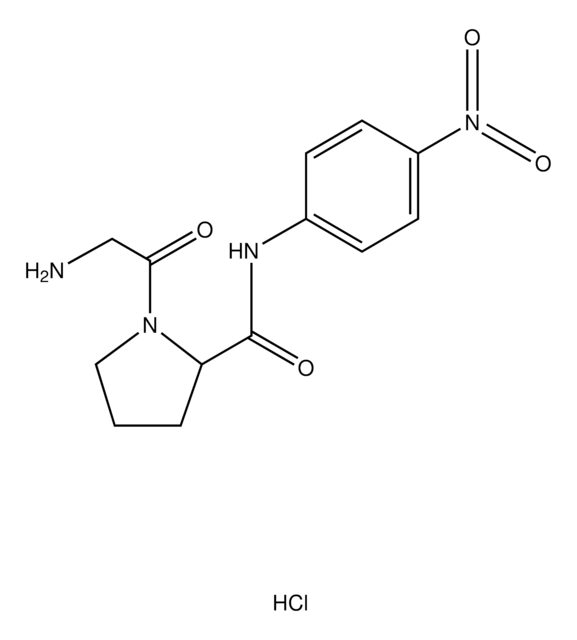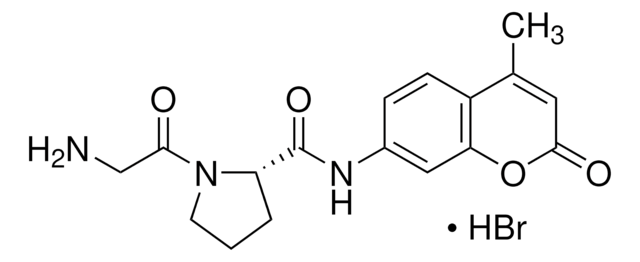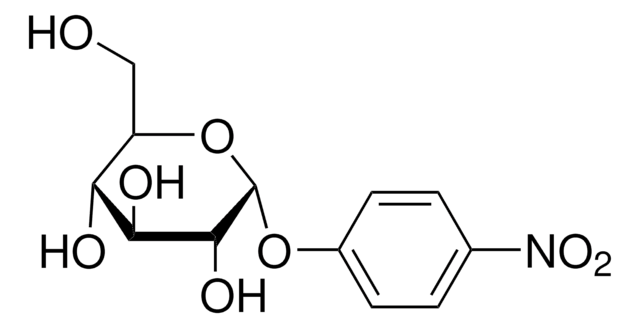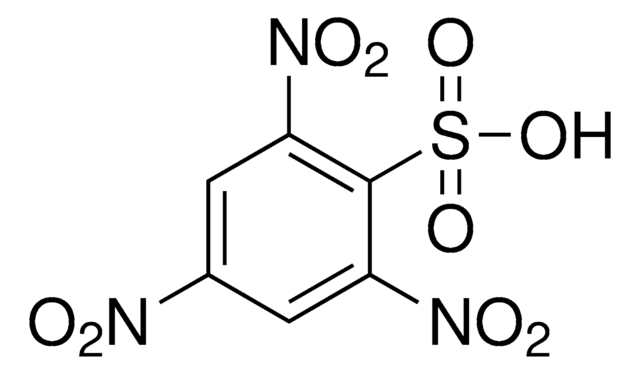317640-M
Dipeptidyl Peptidase IV (CD26), Porcine Kidney
Sinónimos:
CD26, DPPIV
Iniciar sesiónpara Ver la Fijación de precios por contrato y de la organización
About This Item
Productos recomendados
Ensayo
≥90% (SDS-PAGE)
Nivel de calidad
Formulario
liquid
actividad específica
≥35 units/mg protein
fabricante / nombre comercial
Calbiochem®
condiciones de almacenamiento
OK to freeze
avoid repeated freeze/thaw cycles
temp. de almacenamiento
−70°C
Descripción general
Native, DPP IV purified from porcine kidney (renal brush border of the proximal tubule). A serine exopeptidase dimer composed of two identical subunits of 110-130 kDa. Cleaves Xaa-Pro dipeptides from the N-terminus of oligo and polypeptides. DPPIV is involved in many cellular processes such as activation of cytokines, differentiation, T cell activation, and cell-matrix interactions. Inhibition of DPPIV has been reported to be an effective treatment for type II diabetes. MW: ~210000-260000 (unreduced).
Envase
Please refer to vial label for lot-specific concentration.
Advertencia
Toxicity: Standard Handling (A)
Definición de unidad
One unit is defined as the amount of enzyme that will hydrolyze 1.0 µmole 7-(Gly-Pro)-amino-4-methylcoumarinamide per min at 37°C, pH 8.5.
Forma física
In 20 mM Tris-HCl, 5 mM CaCl₂, 1 µM ZnCl₂, 0.05% NaN₃, pH 8.0.
Reconstitución
Dilute only the amount of enzyme needed for each assay. Upon thawing, do not re-freeze, store in the refrigerator (4°C).
Otras notas
Bar, J., et al. 2003. Biol. Chem.384, 1553.
Engel, M., et al. 2003. Proc. Natl. Acad. Sci. USA100, 5063.
Ikehara, Y., et al. 1994. Methods. Enzymol.244, 215.
David, F., et al. 1993. J. Biol. Chem.268, 17247.
Thomsen, P.D., et al. 1993. Mamm. Genome4, 604.
Misumi, Y., et al. 1992. Biochim. Biophys. Acta.1131, 333.
Seidl, R., et al. 1991. Biol. Chem. Hoppe Seyler372, 213.
Checler, F., et al. 1985. J. Neurochem.45, 1509.
Imai, K., et al. 1983. J. Biochem.93, 431.
Kato, T., et al. 1979. Experientia.35, 409.
Kojima, K., et al. 1979. Anal. Biochem.100, 43.
Kato, T., et al. 1978. Biochem. Med.19, 351.
Kenny, A.J., et al. 1976. Biochem. J.157, 169.
Engel, M., et al. 2003. Proc. Natl. Acad. Sci. USA100, 5063.
Ikehara, Y., et al. 1994. Methods. Enzymol.244, 215.
David, F., et al. 1993. J. Biol. Chem.268, 17247.
Thomsen, P.D., et al. 1993. Mamm. Genome4, 604.
Misumi, Y., et al. 1992. Biochim. Biophys. Acta.1131, 333.
Seidl, R., et al. 1991. Biol. Chem. Hoppe Seyler372, 213.
Checler, F., et al. 1985. J. Neurochem.45, 1509.
Imai, K., et al. 1983. J. Biochem.93, 431.
Kato, T., et al. 1979. Experientia.35, 409.
Kojima, K., et al. 1979. Anal. Biochem.100, 43.
Kato, T., et al. 1978. Biochem. Med.19, 351.
Kenny, A.J., et al. 1976. Biochem. J.157, 169.
Información legal
CALBIOCHEM is a registered trademark of Merck KGaA, Darmstadt, Germany
Código de clase de almacenamiento
12 - Non Combustible Liquids
Clase de riesgo para el agua (WGK)
WGK 2
Punto de inflamabilidad (°F)
Not applicable
Punto de inflamabilidad (°C)
Not applicable
Certificados de análisis (COA)
Busque Certificados de análisis (COA) introduciendo el número de lote del producto. Los números de lote se encuentran en la etiqueta del producto después de las palabras «Lot» o «Batch»
¿Ya tiene este producto?
Encuentre la documentación para los productos que ha comprado recientemente en la Biblioteca de documentos.
Nuestro equipo de científicos tiene experiencia en todas las áreas de investigación: Ciencias de la vida, Ciencia de los materiales, Síntesis química, Cromatografía, Analítica y muchas otras.
Póngase en contacto con el Servicio técnico